Latest News
Leonard Bernstein and Summer Music Festivals: A Legacy of Excellence and Inspiration
Posted June 26, 2024
Leonard Bernstein and Summer Music Festivals: A Legacy of Excellence and Inspiration
by Craig Urquhart
Leonard Bernstein loved summer. The combination of warm weather, fresh corn on the cob, and the opportunity to make music outdoors – especially with young people – brought out his deepest exuberance and joy.
Throughout his life, Bernstein participated in numerous prestigious summer music festivals worldwide. His involvement in these festivals not only showcased his exceptional talents, but also inspired generations of musicians and music lovers.
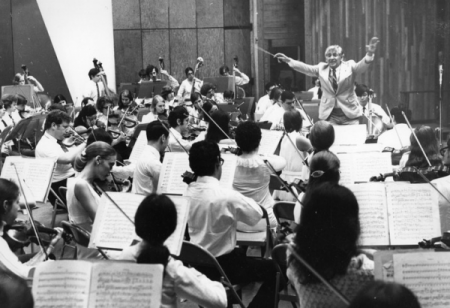
Leonard Bernstein conducting a Tanglewood Music Center student orchestra concert 1970. Photo by Heinz Weissenstein/Whitestone Photo, courtesy of the Boston Symphony Orchestra Archives.
Tanglewood
Tanglewood, located in the scenic Berkshire Hills of Massachusetts, was where Bernstein first attended as a student in 1940, studying under the legendary conductor Serge Koussevitzky. It was also where Bernstein made his conducting debut. His commitment to Tanglewood burned bright throughout his lifetime. He conducted many memorable concerts with both the Boston Symphony Orchestra and The Tanglewood Music Center Orchestra. Notable events include the American premiere of Benjamin Britten’s opera Peter Grimes (1946); the premiere of his Symphonic Suite from On the Waterfront (1955); the legendary 1986 concert with the then 14-year-old Midori performing his Serenade (and popping a string twice in one performance); and his final concert on August 19, 1990.
His performances and masterclasses at Tanglewood comprised an indelible legacy. Leonard Bernstein is a revered figure in the festival's history.
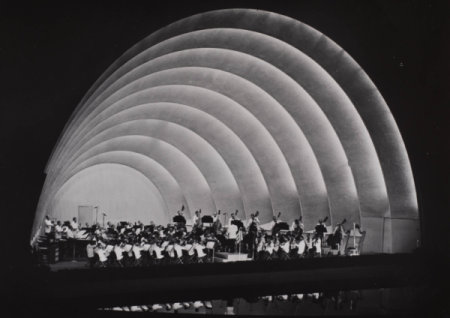
Leonard Bernstein conducting the New York Philharmonic at the Hollywood Bowl, September 2, 1960. Courtesy of the New York Philharmonic Digital Archives.
The Hollywood Bowl
This iconic amphitheater in Los Angeles was the site of Bernstein’s 1944 Los Angeles debut, at which he performed Gershwin’s Rhapsody in Blue and his own Fancy Free. In 1955, he served as Artistic Director of the Festival of the Americas and performed his Serenade at the Bowl, with Isaac Stern as soloist. In 1982, together with Ernest Fleishmann, he co-founded the Los Angeles Philharmonic Institute, a summer training program for instrumentalists and conductors. Bernstein taught there for two years; many of the concerts were performed at the Hollywood Bowl. Bernstein’s final visit to the Hollywood Bowl was in the summer of 1986, conducting the New York Philharmonic.
Schleswig-Holstein Music Festival
In 1986, Bernstein and pianist Justus Frantz founded the Schleswig-Holstein Music Festival in Germany, known for its emphasis on international collaboration and cultural exchange. The following year, Bernstein founded the Orchestra Academy of the festival, which brought together young musicians from around the world. It also served as a training ground for a few select young conductors. Bernstein’s conducting seminars were filmed, and they serve as a vivid testament to his love of teaching. Bernstein also toured with the young orchestra to Milan, Paris, Taormina, Leningrad, Moscow, and East and West Berlin.
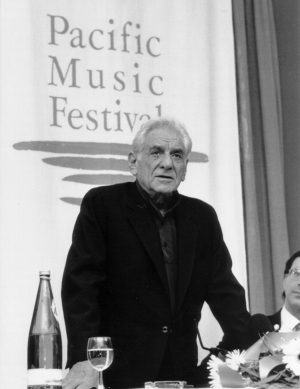
Leonard Bernstein announcing the first Pacific Music Festival.
Pacific Music Festival
In 1990, the last year of his life, Leonard Bernstein -- along with the London Symphony and conductor Michael Tilson Thomas -- founded the Pacific Music Festival in Sapporo, Japan, with the aim of creating a premier training ground for young musicians from around the world, With an emphasis on countries along the Pacific Rim. Inspired by Bernstein's vision of musical excellence and cultural exchange, the festival quickly gained international acclaim. Bernstein's dedication to nurturing emerging talent and promoting cross-cultural understanding continues to be a guiding principle of the Pacific Music Festival, which remains a vibrant and influential institution.
Ravinia Festival
Another festival where Bernstein performed over a span of 40 years was The Ravinia Festival, the summer home of the Chicago Symphony Orchestra, located in Highland Park, Illinois (one of the suburban paradises cited in the opening number of Bernstein’s opera, Trouble in Tahiti.) Bernstein conducted a series of concerts with the Chicago Symphony in 1944, 1945, and 1956. He returned to the festival in 1985 with the National Symphony Orchestra and in1986 with the New York Philharmonic. The Ravinia Festival has performed many of Bernstein’s compositions, including, most recently, his Symphony No. 3: Kaddish and his monumental theatre work, MASS. Ravinia is also home to the Music Box Pavilion, which features a multi-sensory journey called “Bernstein’s Answer.” A cast of special guests, combined with surreal visuals and a stirring soundtrack of his works, guides audiences to feel a deeply personal connection to the power of music through the lens of this iconic 20th century musician.
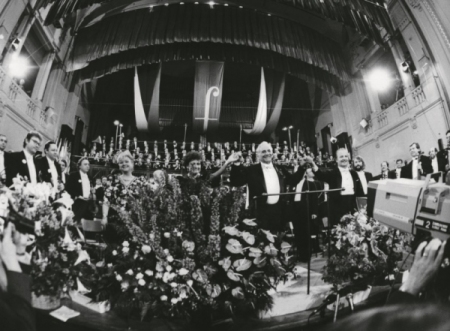
Leonard Bernstien at the 1990 Prague Spring Festival
Prague Spring International Music Festival
The Prague Spring International Music Festival was founded in May of 1946. Bernstein made his European debut at the festival’s inaugural concert with the Czech Philharmonic. He presented an all-American program featuring the composers Gershwin, Barber, Copland, Harris, and his own Symphony No. 1: Jeremiah. He also appeared the following year, giving the European premiere of Copland’s Symphony No. 3. On June 2 and 3, 1990, Bernstein came back to the festival to celebrate Czechoslovakia’s return to democracy. His performance there of Beethoven’s Ninth Symphonywas to be Bernstein’s final concert in Europe.
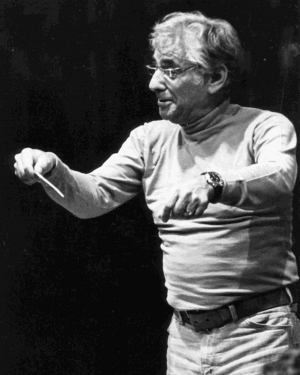
Leonard Bernstein at a rehearsal at the Salzburg Festival, 1975 © Archiv der Salzburger Festspiele/Photo Ellinger.
Salzburg Festival
The Salzburg Festival, renowned for its impeccable standards and rich history, provided a fitting stage for Bernstein's artistry. His association with Salzburg began in 1959 when he brought the New York Philharmonic, performing his Symphony No. 2: The Age of Anxiety with Seymour Lipkin as pianist. Bernstein returned to the Festival in the '70s and '80s with the London Symphony Orchestra, Israel Philharmonic, and the Vienna Philharmonic.
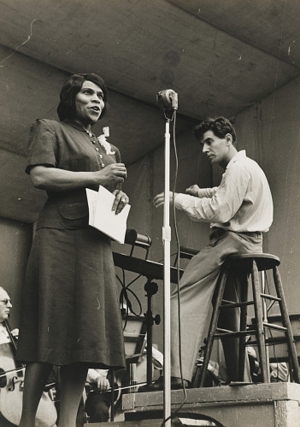
Marian Anderson and Leonard Bernstein performing at Lewisohn Stadium, 1947. © Ruth Orkin.
Summers in New York City
Bernstein’s long association with The New York Philharmonic began on November 14, 1943, when he replaced conductor Bruno Walter, who had taken ill. The following summer, he returned to the orchestra conduct them at the summer concert series at Lewisohn Stadium in upper Manhattan. He and the New York Philharmonic appeared there many times over those years, and they made a number of live recordings. On June 26, 1947, he and the orchestra presented contralto Marian Anderson performing Handel and Massenet. And on July 14, 1956, he conducted the Lewisohn Stadium Symphony Orchestra (made up of members of the New York Philharmonic) with Louis Armstrong and his All-Stars. The famous composer and trumpeter W.C. Handy was in the audience. The concert drew a crowd of 21,000.
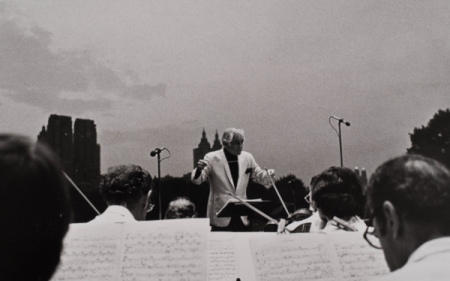
Leonard Bernstein conducting the New York Philharmonic in Central Park, July 4, 1976. Courtesy of the New York Philharmonic Digital Archives.
In 1965, the New York Philharmonic presented its first-ever concert in Central Park’s Sheep Meadow. This beloved concert series was conducted by Bernstein in 1966 and 1974, drawing an audience of over 100,000. On July 4, 1976, he conducted the orchestra for a Bicentennial Celebration in Sheep Meadow, and in 1986, he presented the orchestra on The Great Lawn of Central Park, drawing an audience of over 200,000.
From Los Angeles to Salzburg to Sapporo and beyond, Bernstein's contributions enriched the cultural landscape and inspired countless listeners. As we celebrate Bernstein's legacy, we are reminded of the vital role that summer music festivals play in fostering artistic excellence and cross-cultural understanding.
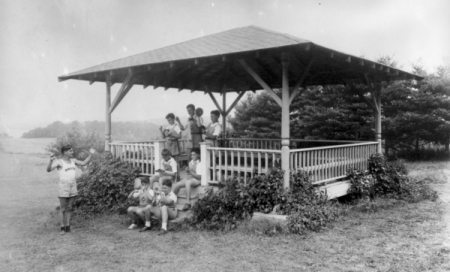
The first known photograph of Bernstein as a conductor. As a camp counselor he is conducting the Camp Onota Rhythm Band, 1937. Courtesy of the Library of Congress Music Division.